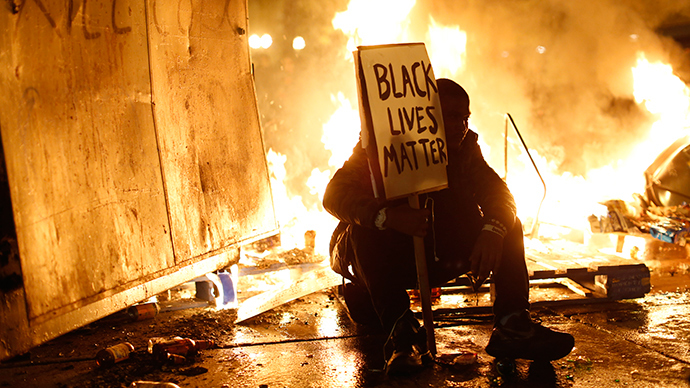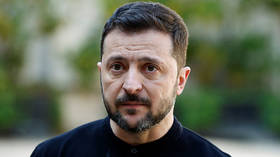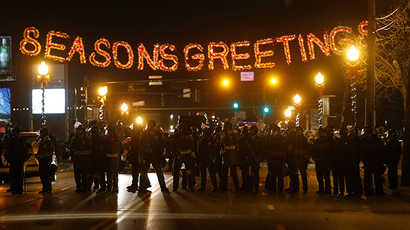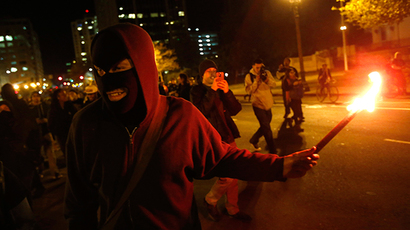Feds to continue Ferguson investigations despite grand jury decision

Two federal investigations into the fatal shooting of unarmed black teenager in Ferguson, Missouri continue despite the Monday announcement of a St. Louis County grand jury decision not to indict police officer Darren Wilson for Michael Brown’s murder.
Outgoing US Attorney General Eric Holder said Monday that the US Department of Justice is still in the midst of two investigations stemming from the Aug. 9 shooting of 18-year-old Brown.
"While the grand jury proceeding in St. Louis County has concluded, the Justice Department's investigation into the shooting of Michael Brown remains ongoing," Holder said in a statement.
No indictment: Clashes, arson after grand jury verdict for Ferguson cop
Federal prosecutors are attempting to determine whether officer Darren Wilson should be subject to civil rights charges for the incident. The Justice Department is also involved in a wider probe of the entire Ferguson Police Department based on long-criticized policing tactics.
Of the possible federal civil rights charges, Holder said such cases have a "high legal bar," adding that federal investigators have "resisted forming premature conclusions."
LIVE UPDATES on Ferguson reaction to grand jury decision
"Though we have shared information with local prosecutors during the course of our investigation, the federal inquiry has been independent of the local one from the start, and remains so now," Holder said. "Even at this mature stage of the investigation, we have avoided prejudging any of the evidence."
Holder also said the Justice Department "continues to investigate allegations of unconstitutional policing patterns or practices by the Ferguson Police Department."
The killing of Brown, who was shot at least six times, sparked months-long protests and anger in Ferguson, a predominantly black suburb of St. Louis whose community officials and police officers are mostly white, and across the nation in communities that have seen similar police slayings - especially of young black men - go unpunished.
What the jury heard as Darren Wilson defended the killing of Michael Brown
Justice Department officials have not commented on the status of either investigations. The Washington Post reported last month that investigators “have all but concluded” there is not a strong civil rights case against Wilson. A Justice Department spokesman called the story an “irresponsible report” based on “idle speculation,” according to Yahoo News.
For civil rights charges to stick, prosecutors must prove Wilson was actively seeking to violate Brown’s constitutional rights, and that more force than necessary was used.
“It’s very hard to prove,” said William Yeomans, a former prosecutor with the Justice Department’s Civil Rights Division, which is investigating the Ferguson killing.
“It’s difficult to prove exactly what was in his mind at the time, that he wasn’t acting out of a reasonable sense of fear,” he added, according to Yahoo News. “It’s a very hard standard to meet - not impossible, but very, very tough.”
Proving Wilson acted out of undue aggression rather than fear is the hurdle prosecutors must clear. Released evidence in the Ferguson grand jury decision, announced late Monday by St. Louis County prosecutor Bob McCulloch, showed that one of the six shots Wilson fired at Brown occurred inside the officer’s patrol car, signaling a possible struggle between the two. Wilson said Brown reached into the car and punched him, leading the officer to fear for his own safety. The other shots were fired in the middle of Canfield Drive, where Wilson exited his car as Brown tried to flee the scene. Witnesses said Brown had his hands raised in surrender as Wilson fired five more shots into his body. Yet even this evidence may not be enough to prove Wilson violated Brown’s civil rights.
Ferguson burning: Torched cars, tear gas in massive night riots (DRAMATIC IMAGES)
In the case of the 1999 shooting death of Amadou Diallo by New York City police officers - during which the 23-year-old immigrant from Guinea was shot 41 times when officers believed he was reaching for gun that was actually his wallet - Justice officials could not prove the officers did not fear for their own safety or that of others. Yet, in 1993, prosecutors successfully pressed civil rights charges against two of four Los Angeles police officers who beat Rodney King, though there was video evidence in that case.
The Justice Department may have an easier time proving that the Ferguson Police Department has engaged in abusive policing strategies and tactics before and after Brown’s shooting.
“I think everybody sees that as a foregone conclusion,” a former St. Louis prosecutor close to Ferguson officials said, according to Yahoo News. “People know something has to change.”
The Albuquerque, New Mexico Police Department recently reached an agreement with the Justice Department after a similar probe into its use of excessive force against civilians. Among other policies intended to build confidence among the community, the Albuquerque police accepted an independent monitor who will have oversight over reforms of the department over the next two years.
“While constructive efforts are underway in Ferguson and communities nationwide, far more must be done to create enduring trust,” Holder added in his statement. “The department will continue to work with law enforcement, civil rights, faith and community leaders across the country to foster effective relationships between law enforcement and the communities they serve and to improve fairness in the criminal justice system overall.”















